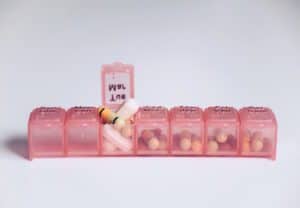Use These Tips To Organize And Schedule Your Medications
Do you take medication every day but have trouble staying organized? Are you tired of rummaging through cabinets and drawers in search of your pills? Being organized with your daily medications can make life a lot easier. Not only will it help keep track of dosages and usage frequency, but it can also be great for preventing missed doses.
Here are our tips to keep your daily medication easy and organized:
- Create a daily or weekly schedule
- Use a pill box or organizer
- Set alarms or reminders on your phone
- Consider using a mobile app
- Consult with your doctor about using multiple medications
- Make sure you understand how to take each medication
In this blog post, we’ll provide helpful advice on ways to keep all your meds easy to find and access each day, so you don’t lose any time juggling bottles around or creating an unorganized mess. Read on to learn more about taking the hassle out of managing your long-term prescriptions!
Create A Schedule To Stay On Top Of Your Medications
Staying on top of your medications can be a challenge, especially if you have multiple health conditions to keep track of. Designing a daily or weekly schedule can help reduce stress and ensure that you take the correct medications at the right time. Setting realistic goals like carving out specific times of day to take medicine will make sticking with a medicine routine much easier.
Having incorporated breaks and reminders into your medication schedule is a great way to stay consistent and organized. Committing to your personalized schedule will put you in control of maintaining healthy habits. You can also create positive reinforcement by rewarding yourself for regularly adhering to the schedule and reminding yourself that even small changes can make a big difference in your health overall!

Use A Pill Box Or Organizer To Store Your Different Medications
You may have trouble remembering to take your medication every day or have difficulty keeping your pills in order. That’s why using a pill box or organizer can make an extraordinary difference in your daily life. Having a designated container for all of your medicines ensures you can easily view and access what you need without the hassle of searching through different bottles and packages.
Plus, many boxes come with clear labels, so there’s no confusion between multiple medications. Don’t be shy about splurging for a nice one or one that fits your personal style. By being organized with coordinating organizers, you can help keep a consistent routine that allows you to stay on top of taking your medicine as prescribed by your doctor.
Set Alarms Or Reminders On Your Phone To Take Your Medications
Everyone can relate to occasionally forgetting to take medication, but it is especially important for those with chronic conditions to stay on top of their prescriptions! A helpful tip for remembering is to set alarms and reminders for when you need to take your medications. There are countless alarm and reminder apps available for both iOS and Android devices, so regardless of what kind of phone or computer you use, you’ll be able to keep track of your prescription schedule. Setting alarms and reminders is an easy way to help yourself stay on top of staying healthy!
Consider Using A Mobile App To Help Keep Track Of Your Medications
If you’re tired of sorting through all sorts of pill bottles and endlessly trying to establish a medication schedule, look no further than PillPack, Medisafe, or MyMeds! These mobile apps provide a convenient way for you to keep track of your daily medication dosages and manage reminders for refills. With clear displays of health information and an easy-to-navigate design, these apps make it simpler than ever to stay on top of your health. They even link up with any doctors or pharmacies associated with your health care plan, so you can access needed updates quickly and securely. So if control over your health is a priority in your life, don’t hesitate to use one of these helpful apps!

Consult With Your Doctor About How To Manage Multiple Medications
It is important to always talk to your doctor when taking any medication or supplement, as some may have interactions or side effects that you should be aware of. When discussing your medications with your physician, make a list of all the medicines, vitamins, and supplements you are taking on a regular basis so they can assess if any potential reaction could occur. Also, share with your doctor any health issues that could influence which medications are safe for you to take.
The more open and thorough the conversation, the better chance you have of avoiding unwanted reactions from your medications. Your doctor is there to guide and help you make the best choices for your health, so don’t hesitate to start up a conversation about medications today!
Make Sure You Know The Important Things About The Medications You Take
Whether a prescription seems simple or complicated, it’s important to always ask questions when picking it up from the pharmacy. You’ll want to be sure that you understand storage, usage, and dosage instructions as they are crucial to maintaining your health and safety. Don’t worry – pharmacists are experts in medications, so they know all the details and can break them down into easily understandable language.
If there is anything you don’t understand, you should never hesitate to ask for more information until you are fully comfortable with what is prescribed. Asking questions shows that you care about understanding how best to use your medications. Doing this will maximize its potential benefit while minimizing any risk it may cause. So next time you need a prescription filled, make sure to always ask questions – it’s the smart thing to do!

The Bottom Line
For those needing help in managing their medications, remember that it’s important to set a schedule, use alarms and reminders, talk to your doctor regularly, and take advantage of app-based tools like PillPack, Medisafe, or MyMeds. Above all else, stay vigilant and be sure to always understand the instructions you receive from the pharmacy and ask questions if something doesn’t seem right. This is especially true when switching to a different medication or dosage.
Managing several prescriptions can seem intimidating at first but taking preventive measures such as these won’t have to be an overwhelming task. So be patient with yourself, stay organized, and get the support you need to successfully stay on top of your medication regimen! Thanks for reading our article today, please share it with your friends if it was helpful!
Related Questions
How can I make sure my medication is working correctly?
It’s important to talk with your doctor regularly about how your medications are working for you and if any changes need to be made. Additionally, keep track of any side effects or symptoms that could be related to the medication and report them to your doctor as soon as possible. You should also make sure that you are taking the medication correctly and in the amounts prescribed by your doctor. Finally, if you feel like your medication isn’t working as well as it should, don’t hesitate to discuss this with your doctor. They may be able to adjust the dosage or switch you to a different type of medication.
What if I forget to take my medication?
It’s important to be mindful of when you need to take your medication and set up reminders for yourself. If you do forget, don’t double the dose; just take the next one at the usual time. It’s also a good idea to discuss this with your doctor in case they can provide any advice or other strategies to help you remember. Finally, some medications can be taken as soon as possible if you miss a dose, so make sure to check the specific instructions for your medication.
